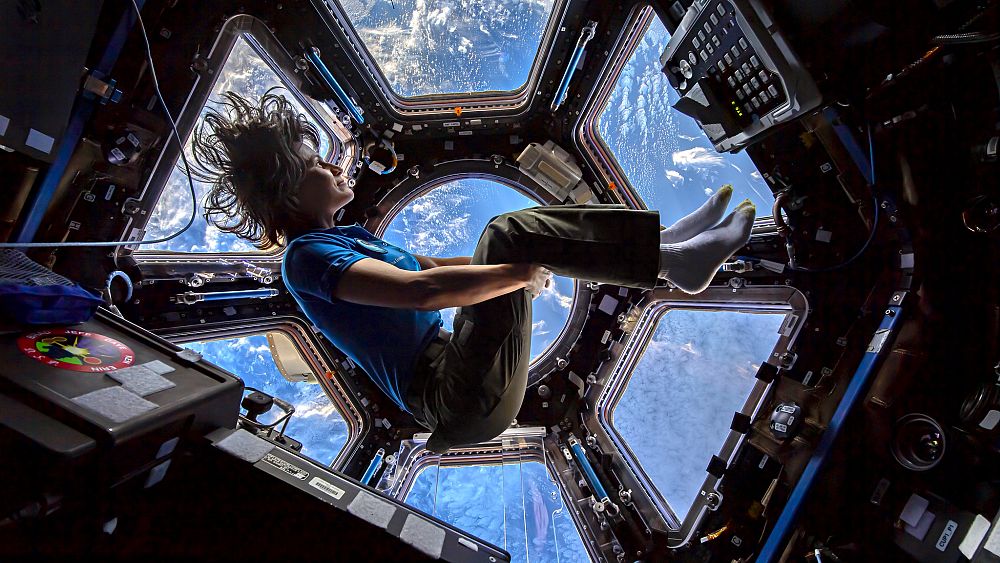According to the European Space Agency (ESA), hibernation could be a solution for long, risky and complex space missions. But how can people do this?
In the film by Morten Tyldum Passengerscharacters Jim Preston (Chris Pratt) and Aurora Lane (Jennifer Lawrence) embark on a 120-year interstellar journey with 5,000 other people.
Their destination: Manor II, a new world where they can start their lives anew.
To survive the journey, the passengers hibernated, each frozen in their own capsule. However, something goes wrong and Jim and Aurora wake up 90 years too early.
But what if we told you that hibernation during space travel is more likely than a romance between Jim and Aurora?
“When it comes to hibernation, people often think of either bears or science fiction stories, but what we do at ESA is somewhere in between,” Angelique van Ombergen explained in the eighth episode of the **Euronews podcast series Tech Talks**. .
Van Ombergen heads the life sciences division at the European Space Agency (ESA) and, among other things, studies the possibility of hibernation during long-duration space travel.
And yet, what is hibernation? And why is ESA studying this process?
Benefits of Sleep Mode
Hibernation is a state in which living organisms slow down their metabolic processes while maintaining basic functions.
In this way, mammals such as bears and bats can survive winters, cope with water shortages and conserve their energy. Given these benefits, ESA and other space agencies are studying whether human bodies can hibernate to survive long-term space travel.
“It’s all focused on the psychological benefits. “Going to Mars is a long and boring journey, it’s like traveling around Spain by car for eight months without being able to stop for gas,” explained van Ombergen.
“Hibernation mode can thus reduce the psychological stress and boredom of the crew,” she added.
In addition to the mental benefits, this metabolic state can provide many logistical benefits.
“ESA is studying a mechanism called torpor. It can be inline or embedded. It reduces the metabolic state of the animal and leads to the need for less water and food,” explained van Ombergen.
In the newspaper “European Space Agency’s Hibernation (Torpor) Strategy for Deep Space Missions: Linking Biology to Engineering,” ESA study by Jennifer Ngo-Anh details that to fly to the Red Planet, astronauts will need about 30 kg of food, water, air and other materials . for a day.
Thus, hibernation can significantly reduce their basic needs.
In addition, hibernation can have a positive effect on the health of astronauts.
“Torpor offers some kind of protective mechanism when it comes to muscles and bones, as well as greater protection from radiation,” van Ombergen explained in his paper. Euronews technical talks.
During long-term space flights, astronauts are indeed exposed to radiation, which increases the risk of cancer, cataracts and nervous system problems. However, hibernation will occur in containers of water that serve as a protective shield for astronauts in orbit.
Long haul
Just like in the Passenger spacecraft, the cosmonauts will spend the winter in individual shells.
Once inside these capsules, they will receive drugs that regulate their metabolism, lower their core temperature, and render them numb. Once back on Earth, they will awaken and gradually restore their normal functional metabolism.
But this is just a theory.
Other space agencies are studying whether lowering body temperature and subsequently stimulating metabolism is a more feasible option, while most research projects currently focus on animals.
“The question is, how can we induce hibernation in species that don’t normally do so? And this is why studies on rats are interesting, and not on animals that hibernate naturally. Research on bears is also important because their body size is more related to body size. ours,” van Ombergen said.
Finally, keep in mind that going into hibernation like Jim and Aurora did to escape to a new planet will still take some time.
But in a few decades, we may see the first hibernating astronauts return home from Mars.

